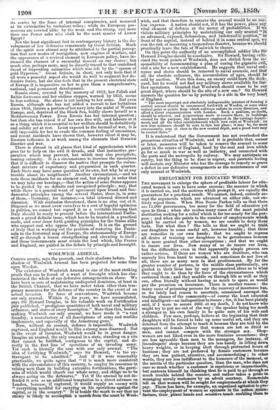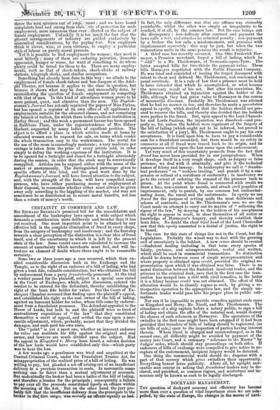EMPLOYMENT FOR EDUCATED WOMEN.
THE movement to enlarge the sphere of profitable labour for edu- cated women is sure to have some success; the manner in which it is carried on, and the motives which prompt it, are equally the guarantees for a practical result. We cannot, indeed, entirely ac- cept the arguments which are advanced on either side, nor en- tirely reject them. When Miss Bessie Parkes tells us that there are 15,000 governesses, too many for the field of education yet open to them ; when she recites many cases of the most painful destitution seeking for a relief which is far too scanty for the pur- pose ; and when she points to the number of employments which might be carried on by women, we are unable to deny these facts. But what then ? She tells us that we ought to train our daughters to some useful art, however humble ; that there are remedies in our own hands; that we ought to repress all desire of training our daughters to be governesses because it is more genteel than other occupations ; and that we ought to insure our lives. Now many of us do insure our lives, but the difficulties even in that apparently simple process are rather serious. If there are women who are destitute, who can scarcely live from hand to mouth, and sometimes do not live at all, there are as many men in that predicament. By far the greater number of persons, in the middle class particularly, are guided in their lives less by any preconceived ideas as to what they ought to do than by the force of the circumstances which surround them ; and they muddle on through life as well as they can, often literally without having so much to spare as would pay the premium on insurance. There is another reason : the many cases of poisoning persons for the recovery of insurance has, as we lately had reason to ascertain, occasioned amongst the trading classes of the community—of course the least educated and intelligent—an indisposition to insure ; for it has been plainly said, if I were to secure5001. at my death, I do not know who might try to put me out of the way ; the speaker being too much a stranger in his own family to be quite sure of his wife and children. Few men, perhaps, believe at the beginning that their daughters will be forced to take up some useful art, and they are deterred from the attempt to teach it because they are told by the opponents of female labour that women are not so fitted as men, and cannot compete with the stronger sex. Shop- women are not liked even in the more feminine avocations; they are less agreeable than men to the managers, for instance, of linendrapers' shops because they are leas handy in lifting dOwn heavy weights, or in keeping alert through protracted hours of business; they are not preferred by female customers because they are less patient, attentive, and accommodating ; in other words, they are less indifferent to the humours of the moment, or the merits of the particular question, than the man, who does not care so much whether a customer is capricious or impracticable, but contents himself by thinking that he is paid to go through so much trouble behind the counter, and rather takes a pride in managing unruly customers by an adroit courtesy. Economists tell us that women will be sought for employments at which they pay. There has been, for example, an organized agitation to pre- vent the employment of women as spinners in the cotton manu- facture, their pliant hands and sensitive touch enabling them to
throw the men spinners out of :enip1, went ; and we have heard complaints loud and strong from chit, Tits of protection for male employment, more numerous than ever 4lected on the subject of female employment. Unluckily it is too much the fact that the present arrangements of industry are guided exclusively by economical considerations, by the paying test. Few employers think it clever, wise, or even virtuous, to employ a particular style of labour on purely moral grounds. Yet it is possible to find employment for women ; they need it most bitterly ; many of them are enduring privation, 'domestic oppression, hunger or worse, for want of something to do where plenty could be found for them to do. There are many employ- ments, such as that of check-takers, check-clerks at railway stations, telegraph clerks, and similar occupations.
Something has already been done in this way : we allude to the employment of female check-takers and box-keepers at the Adel- phi Theatre, not because it applies to the class in question, but because it shows, what may be done, and successfully done, by reconsidering the question of female employment as competing with that olmen. In this kind of attendance women prove to be more patient, quiet, and attentive, than the men. The English- woman's Journal has not only reprinted the papers of Miss Parkes, but has opened a register at its own office of all applicants for employments suitable for the educated classes, and not comprising the branch of tuition, for Which there is the excellent institution in Harley Street ; and this week a permanent bazaar has been opened in Rathbone Place, under the superintendence of Mrs. Sidney Herbert, supported by many ladies of excellent position. The object is to afford a place in which articles made at home by educated women can be exposed for sale, on terms which render the whole transaction easy to the workwomen. The rental for the use of the room is exceedingly moderate ; a very moderate per tentage is taken from the price of every article sold, in order simply to defray the working expenses of the institution. It is to be opened for a fortnight and closed for a fortnight alternately during the session, in order that the stock may be conveniently resupplied. Articles can be exposed eithermith the name of the maker or anonymously. The distinguished patronage given to specific efforts of this kind, and the good work done by the Englishwoman's Journal, will have forced attention to the subject, and, with the strength of the facts, will have compelled many persons, who have either purchasing money or employment at their disposal, to reconsider whether either must always be given away, only according to the higgling of the market, and may not sometimes be so distributed as to secure moral benefits, not less than a return of money's worth.



























 Previous page
Previous page